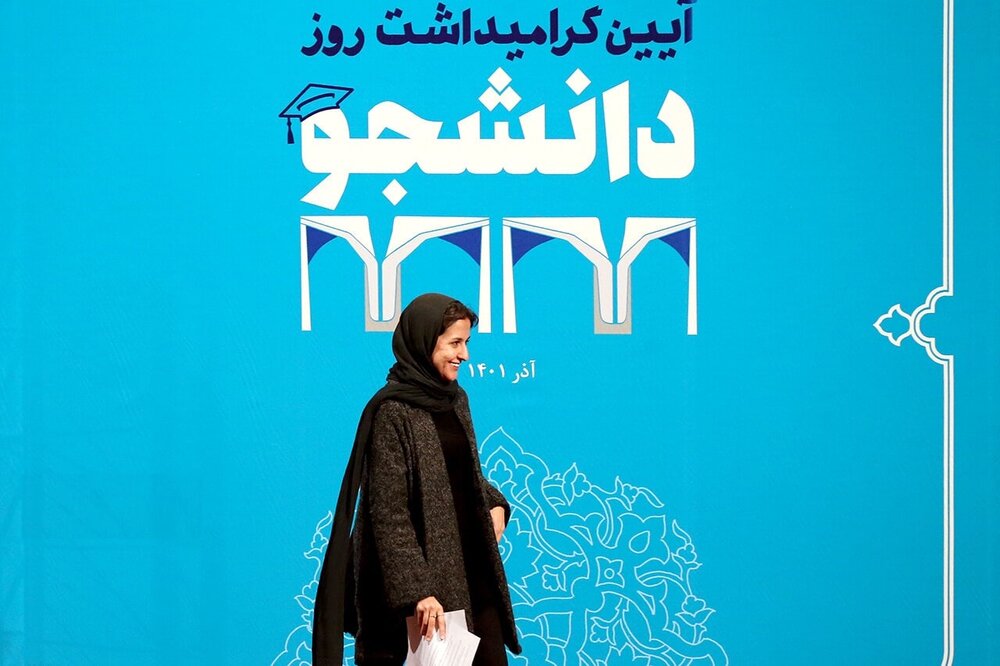Student Day: a pretext for dialogue
Student Day: a pretext for dialogue
Officials from and outside the administration of Ebrahim Raisi headed to universities on the occasion of Student Day to materialize the dialogue policy outlined by the administration in the wake of the recent unrest.

December 7 marks Student Day in Iran. Every year, Iranian officials often descend on universities across the country to get in touch with the vibrant student atmosphere. This year, the occasion has taken on renewed importance amid a highly charged atmosphere in the universities that erupted in the wake of the death of Mahsa Amini.
Several influential figures delivered speeches or held Q&A meetings in the universities. On Tuesday, Parliament Speaker Mohammad Bagher Qalibaf took part in a town hall meeting at Tehran’s Tarbiat Moddarres University. Qalibaf delivered a speech and then gave the floor to a number of students to air their grievances and complaints.
While the meeting of Qalibaf was smoothly in session, Tehran Mayor Alireza Zakani was simultaneously engaged in a bit of scrimmage with students at the prestigious Sharif University of Technology. Despite the tense atmosphere, Zakani answered tough questions raised by angry students. The mayor of Tehran also delivered a speech at Shaheed Beheshti University on Wednesday, which like the previous one, was tense.
And on Wednesday, Iranian President Ayatollah Raisi was at Tehran University underscoring the difference between unrest and protest. Ayatollah Raisi stated that the protest aims to improve affairs and construct things, but the result of unrest is destruction and insecurity.
“A strong Iran is definitely not desired by the Americans, and they are looking to destroy Iran like Afghanistan, Syria, Libya and other countries that have been invaded by this country, but Iran, unlike other countries and territories, has men and women with honor and dignity who will never allow such conspiracies to be carried out by the Americans,” he said.
Expressing why the enemies are angry with the country's universities and student society, President Raisi said, “Our universities are the source of all progress in the country today, and the honors of our scientists in science and technology, nuclear industry, aerospace, and defense and security achievements are the product of the university.”
Despite all the efforts and conspiracies, today our oil exports have increased to the pre-sanctions level, our connections with Asian infrastructure have been established through the Shanghai and Eurasia agreements, the country's foreign trade volume has increased by 48%, and hundreds of semi-closed or closed factories have returned to the production cycle.
Hossein Taeb, the former head of the Intelligence Organization of the Islamic Revolution Guards Corps (IRGC), addressed the situation in Iran from an intelligence point of view in a meeting at Zanjan University.
The gist of his speech was that the unrest in Iran was planned and staged by Western spy agencies.
The Iranian authorities’ blitz on the universities is by no means motivated by the historical occasion, rather it’s a policy of dialogue pursued by the Raisi administration as part of a broader strategy to address grassroots grievances.
In a late October speech, President Raisi identified university as the best venue for dialogue. He described the university as the best place for dialogue and discussion about the recent incidents in the country and offering solutions, adding, “The most important precondition for such dialogues is the correct understanding of issues. If the issues are not analyzed well, they will be affected by the atmosphere created by the media and cyberspace, leading to error.”
Stating that the war today is the war of narratives, President Raisi said, “The enemy had tried a lot to stop the country's scientific, industrial, production and service activities in the country and cut Iran's connection with other countries.”
Maveddat TT, [12/7/2022 7:52 PM]
And in a late November speech, Ayatollah Raisi said, “The government listens to the voices of protestors and the opposition, but protest is different from chaos and disorder. Riot is both an obstacle to dialogue and an obstacle to any kind of development, and people expect it to be dealt with decisively.”
Ali Bahadori Jahromi, the spokesman for the Raisi administration, was the first to implement the strategy of dialogue.
He headed to at least two universities inside and outside Tehran to speak to students.
The presence of officials among the students is no easy task. But it has been effective in strengthening the bonds between the government and the student community. And the Raisi administration has expressed its determination to move ahead with this strategy.

Write your comment.